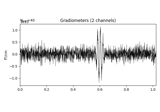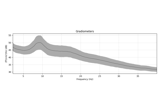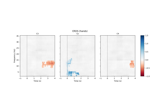mne.time_frequency.tfr_multitaper#
- mne.time_frequency.tfr_multitaper(inst, freqs, n_cycles, time_bandwidth=4.0, use_fft=True, return_itc=True, decim=1, n_jobs=None, picks=None, average=True, verbose=None)[source]#
Compute Time-Frequency Representation (TFR) using DPSS tapers.
Same computation as
tfr_array_multitaper, but operates onEpochsobjects instead ofNumPy arrays.- Parameters:
- inst
Epochs|Evoked The epochs or evoked object.
- freqs
ndarray, shape (n_freqs,) The frequencies in Hz.
- n_cycles
float|ndarray, shape (n_freqs,) The number of cycles globally or for each frequency. The time-window length is thus T = n_cycles / freq.
- time_bandwidth
float, (optional), default 4.0 (n_tapers=3) Time x (Full) Bandwidth product. Should be >= 2.0. Choose this along with n_cycles to get desired frequency resolution. The number of good tapers (least leakage from far away frequencies) is chosen automatically based on this to floor(time_bandwidth - 1). E.g., With freq = 20 Hz and n_cycles = 10, we get time = 0.5 s. If time_bandwidth = 4., then frequency smoothing is (4 / time) = 8 Hz.
- use_fft
bool, defaultTrue The fft based convolution or not.
- return_itc
bool, defaultTrue Return inter-trial coherence (ITC) as well as averaged (or single-trial) power.
- decim
int|slice, default 1 To reduce memory usage, decimation factor after time-frequency decomposition. If
int, returns tfr[…, ::decim]. Ifslice, returns tfr[…, decim].Note
Decimation may create aliasing artifacts.
- n_jobs
int|None The number of jobs to run in parallel. If
-1, it is set to the number of CPU cores. Requires thejoblibpackage.None(default) is a marker for ‘unset’ that will be interpreted asn_jobs=1(sequential execution) unless the call is performed under ajoblib.parallel_backend()context manager that sets another value forn_jobs.- picks
str| array_like |slice|None Channels to include. Slices and lists of integers will be interpreted as channel indices. In lists, channel type strings (e.g.,
['meg', 'eeg']) will pick channels of those types, channel name strings (e.g.,['MEG0111', 'MEG2623']will pick the given channels. Can also be the string values “all” to pick all channels, or “data” to pick data channels. None (default) will pick good data channels. Note that channels ininfo['bads']will be included if their names or indices are explicitly provided.- average
bool, defaultTrue If
Falsereturn anEpochsTFRcontaining separate TFRs for each epoch. IfTruereturn anAverageTFRcontaining the average of all TFRs across epochs.Note
Using
average=Trueis functionally equivalent to usingaverage=Falsefollowed byEpochsTFR.average(), but is more memory efficient.New in version 0.13.0.
- verbose
bool|str|int|None Control verbosity of the logging output. If
None, use the default verbosity level. See the logging documentation andmne.verbose()for details. Should only be passed as a keyword argument.
- inst
- Returns:
- power
AverageTFR|EpochsTFR The averaged or single-trial power.
- itc
AverageTFR|EpochsTFR The inter-trial coherence (ITC). Only returned if return_itc is True.
- power
See also
Notes
New in version 0.9.0.
Examples using mne.time_frequency.tfr_multitaper#

Time-frequency on simulated data (Multitaper vs. Morlet vs. Stockwell vs. Hilbert)

